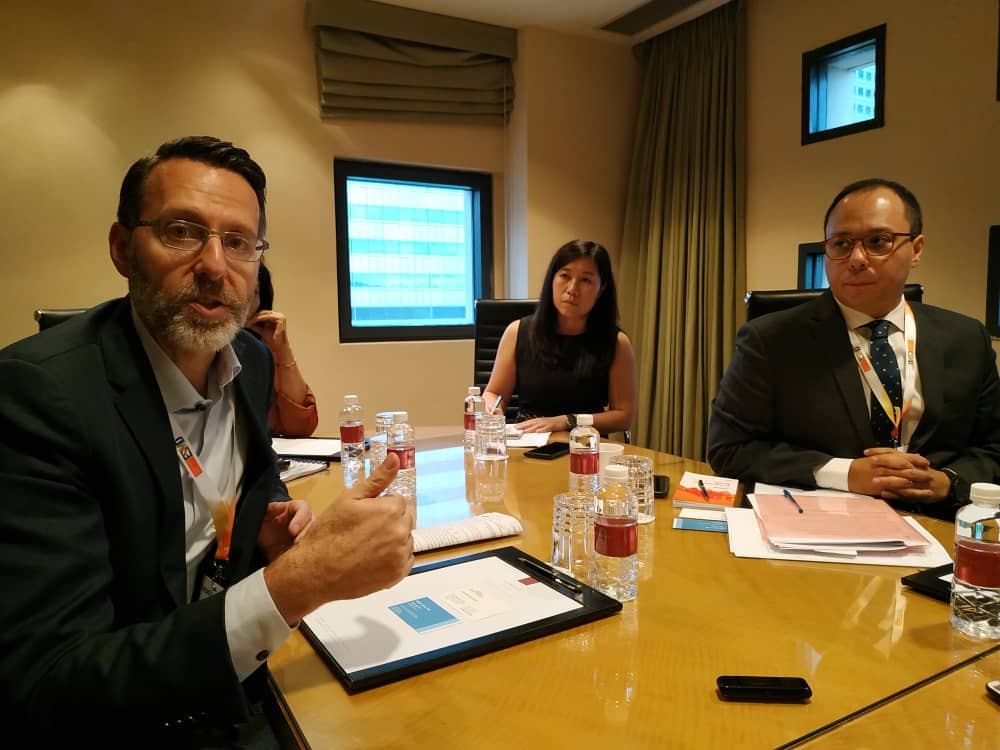SINGAPORE, Nov 28 — A Phase 3 clinical trial showed much longer survival among Asian advanced lung cancer patients on targeted therapy dacomitinib compared to gefitinib, Pfizer Inc announced.
The US-based pharmaceutical giant said an analysis of Asian patients enrolled in the ARCHER 1050 study in China, Hong Kong, Japan and Korea showed that they achieved higher median overall survival on first-line Vizimpro (dacomitinib) at over three years, or 37.7 months, compared to 29.1 months for gefitinib, another targeted therapy.
The Asian subgroup analysis of the global clinical trial also showed median progression-free survival of 16.5 months for patients treated with first-line Vizimpro, compared with 9.3 months on gefitinib. Progression-free survival means how long a patient lives without the disease getting worse.
Median duration of response, which measures how long a tumour continues responding to treatment without the cancer spreading, was 16.6 months in the dacomitinib group, double that of the gefitinib group’s 8.3 months.
Dacomitinib is an epidermal growth factor inhibitor (EGFR) tyrosine kinase inhibitor (TKI) that was evaluated in the ARCHER 1050 study as a first-line treatment for patients with EGFR-positive advanced non-small cell lung cancer (NSCLC). It’s an oral, once-daily tablet.
According to the American Cancer Society, EGFR is a protein on the surface of cells that helps cells grow and divide, but some NSCLC cells have excessive EGFR that motivates faster growth. Drugs called EGFR inhibitors can block EGFR signals that tell the cells to grow.
“The results from the current subgroup analysis provide us with a more robust confirmation of the efficacy of dacomitinib as a first-line treatment option for Asian patients with EGFR-positive advanced NSCLC,” said Professor Tony Shu Kam Mok, chairman of the Department of Clinical Oncology and Li Shu Fan Medical Foundation professor of clinical oncology of the Faculty of Medicine at The Chinese University of Hong Kong, who presented the results at the European Society for Medical Oncology (ESMO) Asia Congress 2019 here last weekend.
The overall survival benefit was maintained even for patients with a dose reduction of dacomitinib.
“We reported, in both the intent-to-treat population as well as the Asian subgroup, that OS (overall survival) benefit was maintained in patients who had a dose modification with dacomitinib at 30mg or 15mg QD (once-daily). This is important as dose modification is the most effective way to manage toxicity, thereby enabling therapy to be better tolerated without compromising on efficacy of treatment,” said Mok.
The analysis of Asian patients in the study also showed a longer duration of treatment on Vizimpro at 77.9 weeks, compared to 52.7 weeks for gefitinib.
The most common side effects observed in the Asian group, like other patients in the study, were diarrhoea (90.6 per cent), nail infection paronychia (64.7 per cent), and acne-like condition dermatitis acneiform (56.5 per cent).
Pfizer’s Commitment To Asia
Chris Ariyan, vice president and emerging markets group lead: oncology of Pfizer Biopharmaceuticals Group, said Vizimpro was released in China last May, just seven months after it was approved in September 2018 in the United States.
“One thing we’re really proud about is we actually did a simultaneous launch, or registration, with the US and China. And that’s a first for us. And Vizimpro was that product,” Ariyan told a media interview at the sidelines of the ESMO Asia Congress.
Pfizer also managed to get dacomitinib into patients’ hands in China in a record 42 days.
“Again, it sort of demonstrates Pfizer Inc’s commitment to Asia as well, and after the China launch, we’re going to move towards the rest of the countries,” said Ariyan.
Pfizer was unable to specify when dacomitinib would be registered in Malaysia, but expressed commitment to bringing innovative medicines and vaccines to Malaysians.
Lung cancer is the third most common cancer in Malaysia after breast and colorectal cancer. Lung cancer has the worst survival rate of all cancers in Malaysia, with only 11 per cent expected to survive for five years. The median survival time is only 6.8 months, according to the Malaysian Study on Cancer Survival 2018.
When asked about Vizimpro prices in Asia, Ariyan said Pfizer preferred to engage country by country on improving access to its products since different nations have specific needs and unique populations. The American pharmaceutical company provides patient assistance programmes in most countries, including Malaysia.
“In Malaysia, we have a support programme, EMBRACE,” said Ariyan, referring to a patient assistance programme that subsidises the cost of palbociclib, a targeted therapy drug for advanced breast cancer patients that’s not available in Malaysian public hospitals.
Pfizer also has a website for Malaysian patients and physicians to get information on its oncology products, resources, and financial assistance.
“Testing is an access barrier as well, so that’s another area where we have a lot of solutions to come in and work with local authorities and local testing agencies to provide testing, or provide subsidies for the testing, because the testing has costs as well,” Ariyan added.
He also said managing side effects of treatment was important to ensure cancer patients don’t come off therapy.
“It’s not just price by itself,” said Ariyan. “It’s a three-pronged approach — what kind of solutions we can bring to the table to help physicians really understand the product, help patients really understand what side effects they’re going to deal with and how to manage those proactively, and that will allow them to stay on therapy for as long as they possibly can.”
Dr Roberto Uehara, vice-president of medical affairs, emerging markets, Pfizer Oncology, said with advances in medicine, radiotherapy, and surgery, cancer has transformed from a death sentence into a chronic disease.
“It’s fascinating to see the advances in science and patients really, for us as a company to help write the part of this story, provide solutions, innovative medicines. This is what makes us wake up everyday and fly all the way from New York to here, and develop research.
“It’s very rewarding. We’re very, very proud to help write a different story for patients.”








